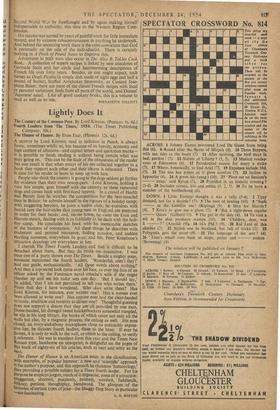Lightly . Does It
The Humor of Humor. By Evan Esar. (Phoenix I 2s. 6d.)
A skEreit by Lord Kinross, read in isolation in Punch, is always funny, sometimes wildly so, but because of its brevity, economy and high content of allusions-and capital letters and quotation marks- it is possible to finish reading it without being certain what was truly going on. This can be the fault of the obtuseness of the reader but one result is that when essays of his are•collected together in a book they support each other and their charm is enhanced. There is time for his reader to learn to keep up with him.
People who think the country is going to the dogs seldom go further for evidence than their own newspapers. Lord Kinross, holding a view less simple, goes himself with the country to these rumoured dogs and comes back with first-hand reports. In a crowd of Health and Beauty fans he watches the competition for the best-muscled man in Britain; he submits himself to the rigours of a holiday camp; with staggering heroism, he joins a nudist club; he examines with horrid care the hair-styles that young men in Englmd are prepared to order for their heads; and, nearer home, he visits the Eton and Harrow. match, dealing with it as faithfully as he dealt with the holi- day camp. He concludes his book with his memorable sketches of the business of coronation. All these things lie describes with exuberant and • pointed innocence, finding paradox, and sudden startling nonsense, everywhere he goes; and Mr. Peter Kncebone's attractive drawings are everywhere in key.
I cherish The Times Fourth Leaders and find it difficult to be detached about them. But they do make me inquisitive. I was once one of a party shown over The Times. Beside a mighty press, someone mentioned the fourth leaders. 'Wonderful, aren't they?' said our guide, enthusiastically. 'All those words about nothing!' And then a top-secret look came over his face, as over the face of an officer asked by the Fantasian naval attache's wife if she might clamber up and see his radar sets one day. 'But I should say,' he added, 'that I am not permitted to tell you who writes them.' From that day I have wondered. Who does write them? Has Lord Kinross, for instance, ever written one? Has a woman ever been allowed to write one? Has anyone ever had the clear-headed urbanity, erudition and temerity to dictate one? Thoughtful guessing does not support a dream that they are all provided by one man. Dome-headed, his donegal tweed knickerbockers somewhat rumpled, he sits in his long library, the books of which cover not only all the walls but also, by a magnetic process, the ceiling as well. His eyes closed, an ivory-and-ebony microphone close to noticeably expres- sive lips, he dictates fourth leaders, three to the hour. If ever he Pauses, it is only to walk to the wall, or climb to the ceiling, to verify a reference. He was in excellent form this year and the Times New Roman type, handsome on newsprint, is delightful on the pages of this book of eighty-six of his articles, each as neat and witty as the next.
The Humor of Humor is an American essay in the classification, with examples, of popular humour: a new and 'scientific' approach
is the author's purpose, and this approach he christens ' humorology,'


























 Previous page
Previous page